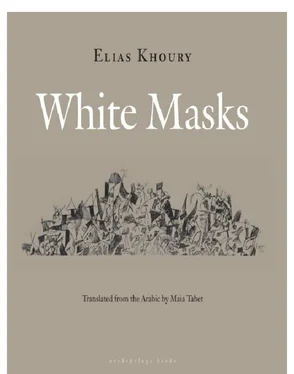The truth be told, Khalil found some consolation in the posters plastered all over the walls in the neighborhood. They had produced a color poster, in red and blue, with the words “Ahmad Khalil Jaber, Hero and Martyr” printed under his picture, and there was an obituary of him with photographs in all the papers. Still, Khalil grieved, and so did I.
Then those three young men came back one day and handed my husband 4,000 lira and told us we would be getting 400 lira on a monthly basis. Khalil told them it wasn’t necessary. They insisted. . they were the ones to insist: they said it was the martyr’s stipend and we must take it. So we took it. It was bad enough that the boy had died, were we also to die of starvation and grief? No Sir! I told my husband he should accept the money. It’s not dirty money, I told him; it’s our due.
That’s when the posters of Ahmad became Khalil’s main preoccupation, before it turned into an obsession. He was upset whenever it rained. They’ll be damaged, he’d say. So he brought home about a hundred of them and went around putting them up on the walls of the neighborhood whenever the old ones peeled off, or when children tore them down or they were covered up with advertisements. Then they began to disappear — no, not disappear, there were just fewer of them; it was only natural, the war was over, and the walls were being covered with new posters for films and plays. Still, he insisted on going around putting up the posters of Ahmad. At the beginning of every month, he would go to the local party office to collect the stipend, and they would make such a fuss of him as the martyr’s father. He got on with them famously now, and slowly these new relationships filled our lives — and Khalil was his old self again.
The war stopped, or subsided, I’m not sure how to put it. . but anyway Khalil was going down to the central post office again, playing checkers at the café, and watching TV. I’m not sure why, but it seems his relationship with the “boys” began to deteriorate. He stopped dropping by for visits and then one day he asked whether I would go and collect the stipend. When I went, I didn’t notice anything wrong, but he told me that the last time he’d been there, he had asked the cadre in charge to reprint the poster because we only had ten of them left. The rain and little fingers were ripping up Ahmad’s pictures, he said, so he needed some reprints. The “officer” apparently didn’t receive him at all well, and in fact started yelling at him, telling him the war was over, and three years had gone by since Ahmad’s death. I could see the man’s point of view, and I told Khalil, it’s over for the one who dies. But he got all upset and said that they were dishonoring Ahmad’s martyrdom, that he no longer felt welcome, and that they had changed their attitude. Truth be told, they weren’t the same as before — in the early days, they visited us regularly, bringing little gifts with them, but now… well, they were probably right, the war was over, and more than half of them had quit and gone back to their jobs. Some had even left the country to work in Saudi Arabia or the Gulf, and the “officer” had more important things on his mind now.
While it was Khalil who told me this, I knew it made him sad. He hung a poster of Ahmad up in our bedroom and carried on the same as before, going to work and to the café, and then coming home and watching TV. He didn’t say very much, but I certainly didn’t sense there was anything wrong. That was about a year and a half ago, in 1979. Khalil seemed reconciled to the situation: there were still a few posters in the wardrobe and there was the one hanging in our room.
But then the fighting started — the war, it’s started up again, I told him. There was shelling everywhere, but he didn’t seem concerned. Even the newspapers had stopped coming into the house, as if he’d gone back to his old self. Only that smile of his was gone. Everything was the same as before, except for the smile and the white head of hair.
But then, how shall I put it. . strange things began to happen whose meaning I couldn’t grasp. . I just didn’t understand anything anymore. All of a sudden, Khalil started to change. . it must have been about three months ago. He just completely changed. Nothing specific happened. Our daughter Nada had a little boy; he was happy about the boy and he went to see her. Nothing happened, but he changed, he became another man. I did everything I could to understand him but he wouldn’t tell me anything. He simply said nothing. Then, one day, he left the house, saying he was going to work. He went and never returned. Whether they kidnapped him or murdered him, I don’t know — all I know is that he never came back, and he was killed.
I’ll have you know, son, we don’t have any enemies. . no one hates us, why should this happen to him? I swear I don’t know. No, no, he wasn’t the foolhardy type, even our visits to our daughter in Tripoli were few and far between. We’re not the adventurous sort, and since the safe route to Tripoli was too long, we just didn’t go.
Honestly, I don’t know how everything happened, I really don’t. I neither see nor understand, all I know is they killed him, they dumped him there, dear God, just like that, naked to the waist… and the garbage. . Oh Lord, I can’t understand it. . I just don’t know. .
The story. .? There is no story. Everything happened so suddenly. We woke up one morning, and he wouldn’t get out of bed. He told me he wasn’t feeling well and wouldn’t be going to work. I went out to buy a few things, and when I got back I found he’d locked himself in the bedroom. I knocked on the door, and when he didn’t open, I started to scream, I thought something terrible had happened to him. But then I heard him speak, and he sounded quite normal, saying, everything’s alright, I’m just a bit busy. So I left him there and went to attend to things in the kitchen. Then it was lunch-time. I knocked again, and again he didn’t open. He said he wasn’t hungry; then it was dinnertime, and he still didn’t come out. I asked him to please open the door because I wanted to go to bed, but he asked me to sleep in the other room. I tried to peep through the keyhole to see what he was up to, but I couldn’t make out anything. So I went out on the balcony — but all I could see from there was that the lights inside the room were switched off. What to do? I said my prayers, asked God to give him guidance, and went to bed in the other room — Ahmad’s, I mean — but it still had his smell and I couldn’t fall asleep there, so I went to the living room and slept on the sofa.
The next morning he came out to go to the bathroom. I went into the bedroom, cleaned and tidied it, and when he came back, he asked me for a bottle of water, and told me to leave. You must be hungry, I said, and told him I would make him a bowl of foul.
He just shook his head to say no. I went and fetched him a bottle of water and when I came back he was in bed. I asked him if he felt ill, whether he needed me to call the doctor, but all he did was shake his head and motion with his hand that I should leave the room. Then I heard the key turning in the lock behind me. It went on like this for about five days, with Khalil spending all day — and night — in bed, neither eating nor sleeping, and only coming out of the room to use the toilet. I was beside myself with worry, and though I tried to be helpful, I just didn’t know what to do. I’d stand outside the bedroom door for hours pleading with him to open up and have something to eat.
Then, one day, he opened the door. It was dusk, almost dark but not quite, and there he stood wearing the same pajamas he’d had on for five days. “Alright,” he said, “I’ll eat.” I went straight to the kitchen and got him a plate of rice and spinach stew, a loaf of bread, and a raw onion.
Читать дальше












